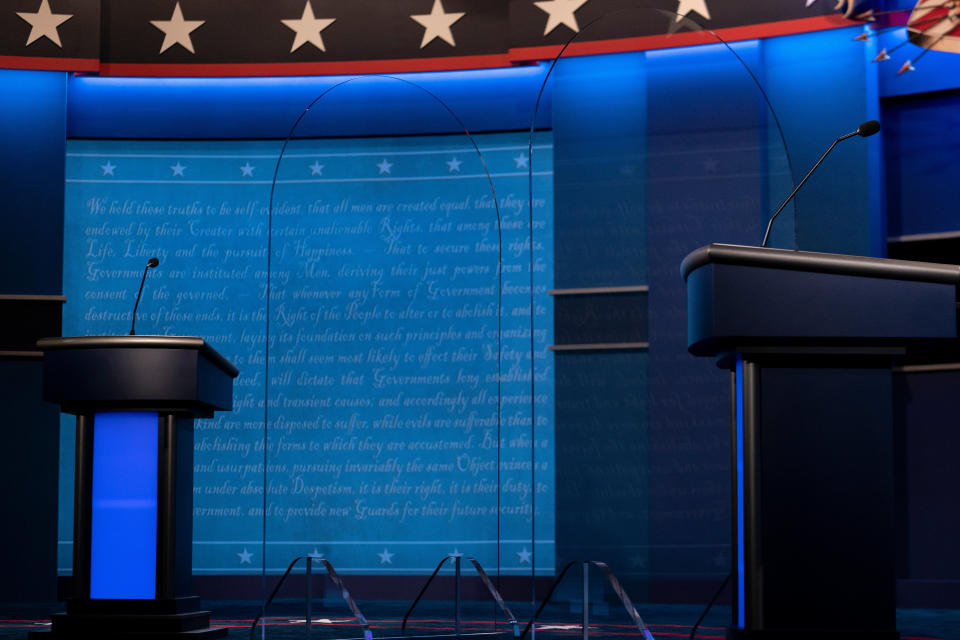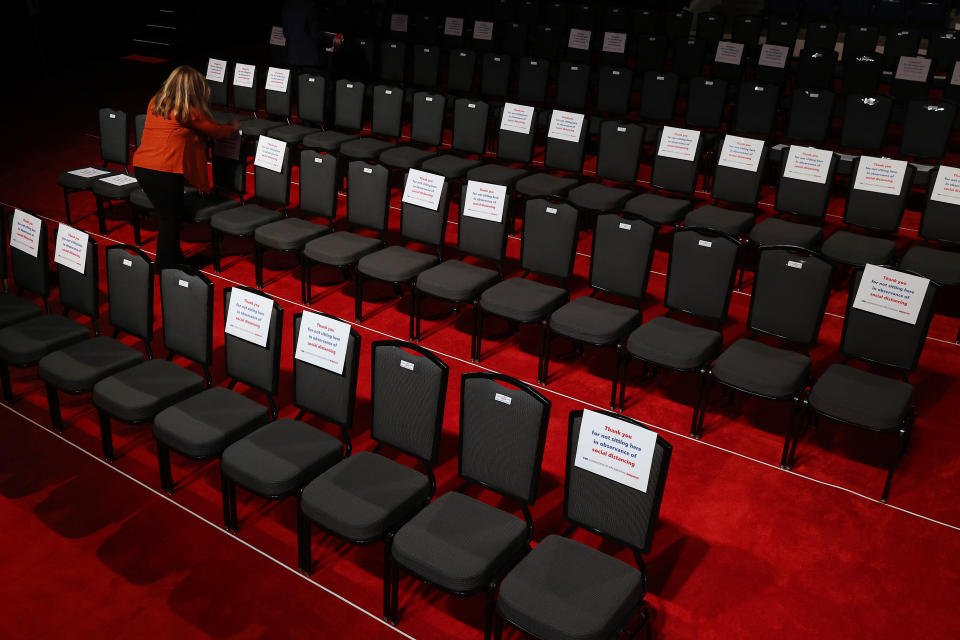COVID-19 safety precautions at the presidential debate are 'adequate,' but may leave some in danger, experts say
President Trump and former Vice President Joe Biden will face off in the final presidential debate at Belmont University in Nashville on Thursday night, just weeks after the president contracted and recovered from COVID-19. Experts say the precautions that have been taken to prevent the spread of the virus are a step in the right direction, but could still leave some of the estimated 200 attendees at risk.
The Commission on Presidential Debates, which sponsors the event, has reportedly put several protective measures in place, including a mask mandate for attendees, pre-testing ahead of the event and social distancing in the audience. Biden has reportedly already tested negative for the virus, and in an email from Yahoo Life asking about President Trump’s status, a spokesperson for his campaign replied that “the President will be cleared by the White House Medical Unit.” White House chief of staff Mark Meadows told reporters on Thursday the president was tested for COVID-19 on his flight to Nashville and was negative.
The Nashville Public Health Department is reportedly installing separate HVAC systems near each candidate to increase airflow. But in a press conference Thursday morning, Nashville Mayor John Cooper warned that a “surge” in cases was occurring in the city, now averaging 175 new infections a day. “Health experts have warned that we need to double down on masks and social distancing to stop this surge in its tracks,” Cooper said.

Nashville experienced a drop in daily COVID-19 cases in September, but city officials have reported a rapid rise in the last weeks — including 249 cases in the past 24 hours alone. In total, Davidson County, where Nashville is located, has 30,115 cases and 328 deaths since the pandemic began, according to Thursday data from the Tennessee Department of Health.
Although the Centers for Disease Control and Prevention has highlighted the importance of ventilation, Dr. Saskia Popescu, an infection prevention specialist at George Mason University, says that the HVAC systems aren’t necessarily as useful as they seem. “I’m assuming they’re saying that they’re using separate air handling units for the candidates ... but I’m not sure how that would be a panacea,” she tells Yahoo Life. “Increasing air exchanges and filtration is the goal.”
Dr. Amesh Adalja, a senior scholar at the Johns Hopkins University Center for Health Security, thinks the precautions taken to protect Trump and Biden are slightly over the top. “I think that they’re just kind of going above and beyond for most of this,” Adalja tells Yahoo Life. “I don’t think that is going to make much of a difference in transmission risk, especially since President Trump is not really a person who can be infected with the virus.” The audience precautions, however, are sufficient.
The fact that Trump just recently recovered from the virus and received infusions of Regeneron’s monoclonal antibody treatment means he’s likely immune from it at this point. “President Trump has recovered from coronavirus and is likely impervious to being reinfected for probably a period of a year or so,” says Adalja. He adds that this immunity may provide some layer of protection for Biden. “If you’re around people that have all been infected, they can serve as a buffer,” he says.
Adalja is more concerned about the people in attendance. “The issue is how the crowd is handled and if they’re doing all the social distancing amongst the crowd members rather than the candidates themselves,” he says. But if people abide by these precautions and the mask mandates, he feels confident that the debate could be a safe experience. “I do think it’s pretty adequate,” he says.

George Mason’s Popescu, on the other hand, has some slight concern about the testing of individuals ahead of time. “The test they’re using is going to be important, and my guess is that they’re using a rapid test, which is lower in both counts,” she says, referring to reports that rapid tests may be less effective for detecting the virus.
For this and other reasons, she feels the debate could have been more safely carried out via Zoom. “I feel that a debate in person is not a good idea — it brings lots of people together, indoors, and for a prolonged period of time,” says Popescu. “The candidates will be unmasked, and ultimately this isn’t a great way to be a role model of what we’ve been pushing people to follow.”
Editor’s note: This story has been updated to reflect the fact that the plexiglass barriers will no longer be used during the debate.
For the latest coronavirus news and updates, follow along at https://news.yahoo.com/coronavirus. According to experts, people over 60 and those who are immunocompromised continue to be the most at risk. If you have questions, please reference the CDC’s and WHO’s resource guides.
How to maintain your physical and mental health during the pandemic
Taking care of a loved one with COVID-19? Here’s how to stay healthy
Q&A with Dr. Kavita Patel: How to keep your family safe and maintain your mental health
Read more from Yahoo Life
COVID-19 superspreader events like Rose Garden, Sturgis Motorcycle Rally have experts worried
Want lifestyle and wellness news delivered to your inbox? Sign up here for Yahoo Life’s newsletter.


